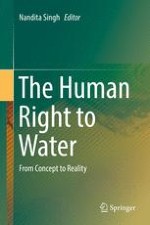2016 | OriginalPaper | Chapter
6. Policy Paradoxes and Women’s Right to Water in Mining Areas of Ghana
Authors : Nandita Singh, Berit Balfors, John E. Koku
Published in: The Human Right to Water
Publisher: Springer International Publishing
Activate our intelligent search to find suitable subject content or patents.
Select sections of text to find matching patents with Artificial Intelligence. powered by
Select sections of text to find additional relevant content using AI-assisted search. powered by
